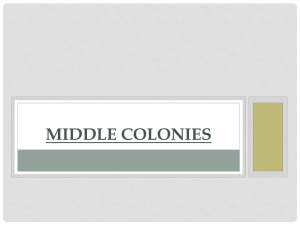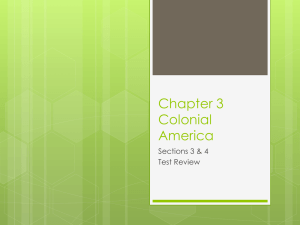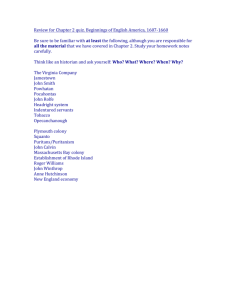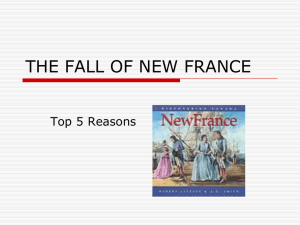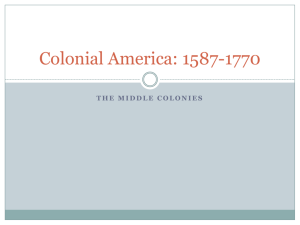4.4 Notes - Brooklyn City School District
advertisement
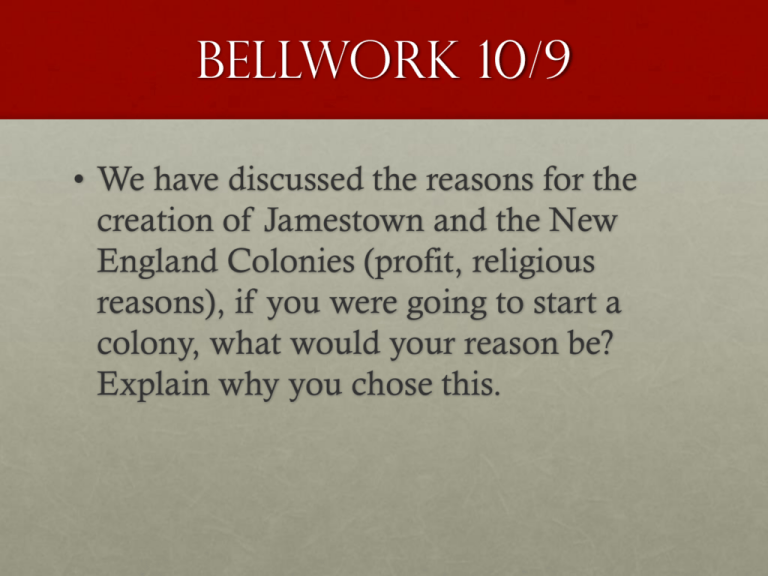
Bellwork 10/9 • We have discussed the reasons for the creation of Jamestown and the New England Colonies (profit, religious reasons), if you were going to start a colony, what would your reason be? Explain why you chose this. Essential Question • By the end of this lesson, you should be able to tell me… • Why were Maryland, the Carolinas, New York, New Jersey, Pennsylvania, and Georgia created? 4.4 Southern and middle colonies Maryland English Catholics also came to America to escape religious persecution, like the Puritans Many English leaders felt that English Catholics would give aid to Catholic countries, like France and Spain Cecilius Calvert, AKA Lord Baltimore, was granted a charter to found a new colony he called Maryland, after England’s queen Henrietta Maria Proprietors – owners o Maryland was a proprietary colony; owned by a group of people Baltimore intended for the colony to be a refuge, or safe place, for English Catholics Protestants began moving into Maryland around the 1640s Religious conflicts between the two groups started. Lord Baltimore created the Toleration Act of 1649, which made restricting the religious rights of Christians a crime. o This was one of the first laws supporting religious tolerance passed in the English colonies The Carolinas In 1663, Charles II gave the land between Virginia and Spanish Florida to eight of his supporters These proprietors named the new southern colony Carolina, the Latin form of Charles In 1712, the colony was divided into North and South Carolina North Carolina had few plantations, towns or churches until the 1700s, mostly smaller farms South Carolina drew many settlers from other English colonies, especially in the Caribbean. o These colonists brought their enslaved Africans with them o SC became one of the first colonies to depend mainly on slave labor Some colonists tried to grow rice in the swampy land of SC o Rice production required many workers, which led to more slaves o By 1730 there were about 20,000 enslaved Africans and about 10,000 white settlers New York and New Jersey The Dutch founded New Netherland as a trading post for exchanging furs with the Iroquois General Peter Stuyvesant (sty-va-sent) took control of the colony as a dictator in 1647 In 1664, the English fleet took over New Netherland and renamed it New York Soon after, the English expanded into territory they called New Jersey Both New York and New Jersey benefited from the fur trade, wheat production, and overseas trade. Pennsylvania William Penn – an original proprietor of New Jersey o Wanted to found his own colony that would provide a safe home for Quakers This colony became known as Pennsylvania Quakers – Protestant religious group (sect) o AKA The Society of Friends They dressed plainly and rejected formal religious practices Supported nonviolence and religious tolerance Separated at birth? William Penn Quaker Oats guy • There is no official ties to Quakers and Quaker Oats • It is a marketing ploy for people to buy their product • Businessmen felt the Quaker ideals of “integrity, honesty, purity — provided an appropriate identity for the company's oat product” What Penn did o Penn tried to create a government that would be fair to all its people, and care for the poor o He limited his own power o He provided ways of changing the colony’s laws to reflect what the people wanted o Sold land to colonists at low prices o Promised religious freedom to all Christians Penn named the capital Philadelphia, The City of Brotherly Love Penn designed the city, laid out in a checkerboard pattern that was used by later city planners Georgia 1732 King George II granted a charter to James Oglethorpe to found Georgia o They received permission to start a colony for poor English citizens Including people who were jailed for unpaid debts Oglethorpe did not want Georgia to have large plantations, but instead smaller farms o He outlawed slavery and limited the size of land grants to reach this goal Many settlers grew tired of these rules, and wanted to allow slavery and larger farms Eventually, Georgia was made a royal colony with new laws, filled with large rice plantations and thousands of slaves.
